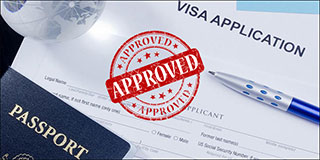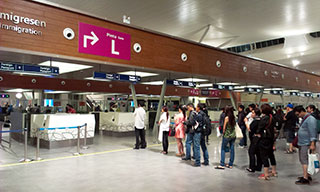Becoming An International Student In Malaysia And Immigration Procedures
by StudyMalaysia.com on June 15, 2017 | Top Stories, Applying & Entering Malaysia to Study

Introduction
So are you ready to become an international student in Malaysia?
The process of applying to enter Malaysia as an international student is simple. You will join more than 122,000 other international students from 160 countries (1-1-2016). The popularity of Malaysia as a higher education destination continues to climb steadily as the country offers an increasing variety of high quality courses at it universities and colleges.
According to the United Nations Educational, Science and Cultural Organisation (UNESCO), Malaysia is among the most preferred tertiary education countries among international students. UNESCO's International Students Mobility Survey 2014 ranked Malaysia as the 12th most preferred education destination in the world.
The Process of Becoming an International Student in Malaysia
Now that you are considering becoming an international student in Malaysia’s higher education institutions, you may be wondering where to begin in applying to study in this country. The chart below outlines the steps involved in preparing you to become an international student in Malaysia. There is no centralised system for international student application. As such, you’ll need to apply directly to the higher education institution(s) you are considering. For where and what to study in Malaysia, our education portal www.studymalaysia.com (established in 1998), is a great place to start in exploring your options.
Good To Know:
At present, there are over 500 private higher educational institutions approved by the Ministry of Higher Education in Malaysia but only about 200 of these institutions are given permission by the Ministry of Home Affairs (in Malay: Kementerian Dalam Negeri Malaysia) to recruit international students. Do make sure that the institution you’re interested in is authorised to enrol international students like you.
All 20 public universities in Malaysia are allowed to recruit international students although not all programmes are open to international students.
 International students are allowed to pursue only full-time courses at public or private higher educational institutions (such as universities and colleges) as well as private educational institutions (such as international schools, skills training providers and language centres).
International students are allowed to pursue only full-time courses at public or private higher educational institutions (such as universities and colleges) as well as private educational institutions (such as international schools, skills training providers and language centres).Before applying for a course, you should consult the student counsellors or representatives of the institution on the most current list of programmes offered and its entry requirements (including English proficiency). Alternatively, you can search our website for more info.
The institution that a student has enrolled at will provide assistance in the application of a Student Pass and Visa to enter Malaysia. Students can also apply for a student visa directly from EMGS via www.educationmalaysia.gov.my.
All foreigners who wish to study in Malaysia at any level of education in Malaysia are required to have a student pass from the Department of Immigration Malaysia.
Make sure that you’re able to finance the entire duration of your studies in Malaysia. Part-time work is limited to 20 hours per week during semester breaks.
It is possible to work after graduation under a new immigration policy. Graduates in critical and high technology areas can obtain employment pass for a period not exceeding two years (please refer to Immigration Department for more information) .
Study Abroad and Processes in Becoming an International Student in Malaysia
1. Identify your reasons to study abroad.
2. Identify the right institution and course; find out if you meet the admission requirements; search our website for more information.
3. Submit application to study forms, relevant documents and application fee directly to selected institutions.
4. Application to institutions is either accepted or rejected. Successful candidates will receive letter of offer from institution(s).
5. Decide on the best offer if you have received more than one offer. Accept the offer and pay the relevant fees.
6. Find out from your institution the requirements for application of Student Pass and Entry Visa. You can also log onto Education Malaysia Global Services (EMGS) website for more details.
7. Applying for a Malaysian Student Pass/Visa - the education institution will apply for a student pass (Visa Approval Letter, VAL) for you while you remain in your country. Alternatively, you can apply your student pass online via EMGS website.
8. Once you receive the VAL (your institution will send to you by post), you can prepare to come to Malaysia. However, you need to check with the Malaysia embassy/consulate in your home country on the visa requirements to enter Malaysia. If you are from a ‘visa-required’ country, you’ll need to apply for a Single Entry Visa to enter Malaysia.
9. Ensure you have all the necessary documents such as a valid passport, VAL, single entry visa (if applicable) and funds, and prepare to come to Malaysia.
10. Meet your institution's representative at airport's immigration check point to help you for custom clearance.
11. Enrol at the institution.
Source: Study in Malaysia Handbook (10th international edition)
Applying To Study in Higher Education Institutions and Deciding on the Best Tertiary Options
1. Why study abroad?
Is the study abroad experience is what you’re looking for? Going abroad gives you global exposure and an opportunity to be independent and to accumulate valuable life experiences. You’ll make new friends with a large network of students from different parts of the world. These are the important ingredients to get employment.
2. Why Malaysia?
As an international student in Malaysia, you will be able to study for an international qualification very affordably. The cost of living here is low, allowing students to have a comfortable and affordable lifestyle. In addition, international students here will experience diverse cultures and have the chance to travel cheaply around the region.
Applying for a student visa to study in Malaysia is a hassle-free process; working during semester breaks is also possible.
3. Identifying the right institution and course for you
What full-time course you want
The very first step in becoming an international student in Malaysia is to decide what full-time course you want to pursue. Some of the important things you need to consider are your career interests and abilities, your career goals, and your budget. Besides the field of study, you need to decide on the level and type of qualification you aspire to have as well as the course duration.
Your search for approved institutions in Malaysia
 In your search for an institution, you need to determine if you meet the entry requirements to pursue the course of your choice. Besides log onto their website, you may also want to consult the official representative of your selected institution in your country or the Education Malaysia Overseas Offices of Ministry of Higher Education Malaysia, if one is available in your country.
In your search for an institution, you need to determine if you meet the entry requirements to pursue the course of your choice. Besides log onto their website, you may also want to consult the official representative of your selected institution in your country or the Education Malaysia Overseas Offices of Ministry of Higher Education Malaysia, if one is available in your country.
(Note: For self-funded students from the P.R. of China, a list of Chinese government approved institutions can be found at their website)
You also need to make sure that the institution you’re applying to is authorised by the Ministry of Home Affairs Malaysia (Immigration Department) to recruit international students. You can refer to the website of Ministry of Higher Education for a list of approved institutions.
Once you have determined which are the approved institutions you can apply to as an international student, you can narrow down your options by the type of course you want to pursue, the level of qualification you are seeking and perhaps the type of institution you prefer to study at. You can find out more details from the institutions’ websites or obtain information from these institutions’ representatives in your home country. You will be amazed by the number of study choices in Malaysia. Here are some options to consider before you make a decision:
-
Type of higher education institution (from public to private Malaysian universities and higher education colleges, foreign university branch campuses, etc.)
-
Type of qualification (from Malaysian home-grown qualifications to UK, Australian, French, and US qualifications, and others)
-
Mode of study for foreign university bachelor’s degree (from 2+1 twinning degrees, 3+0 franchised degrees, external degrees, credit transfer degrees, foreign university branch campus degrees to home-grown dual-award degrees)
-
Type of study field (from healthcare, IT, engineering, business and many, many more), and
- Types of pre-university studies (from A-Levels, IB Diploma, AUSMAT, SAM, Canadian Pre-U, Foundation Studies, and others)
An excellent way to start searching for more education information online is by logging on to our website. This portal was established since 1998 and it contains extensive and reliable information on study options for higher education in Malaysia that is continually updated.
Tips on Choosing the Right Course to Study
Choosing The Right Pre-University Programme
Here are some important things to consider before you decide which pre-university programme to pursue:
- Choice of subjects – this may largely depend on the type of course you plan to pursue at bachelor's degree level so do find out if there are any pre-requisites before deciding on your choice of subjects.
- Duration of study – some programmes are longer than others but may offer more options for undergraduate study so weigh your pros and cons.
- Where (which country) you plan to pursue your bachelor's degree after completing your pre-university programme also matters as some universities could give preference to students with a particular pre-university qualification.
- You may also want to consider the timing of when the pre-university results are released and the intake date of the bachelor's degree programme you intend to pursue (e.g. the intake for most UK universities is in September; and February for most Australian universities)
- Assessment method – are you the type who prefers to sit for one exam at the end of the programme; have a combination of course work and examinations; or is continual assessment throughout the programme more suited for you?
Choosing The Right Bachelor’s Degree Course
- Information gathering – Write in for a prospectus from the institutions you are considering or download it from the website if available. This is so you can have a better understanding of each course you are considering, e.g. the course objectives, course modules, duration of course, assessment methods, entry requirement, English proficiency requirement, course fees, etc.
- Career relevance – You need to choose a course which is relevant to the career you want to pursue. Find out what qualification is required by employers in your own country – is the course you are interested in accepted by the industry?
- Budget – If you are financing your own studies, you need to make sure that you can afford the tuition and all other living expenses. You should explore the options available and ensure it fits your budget.
- Services and facilities – Besides the choice of courses, you may want to consider other factors such as the learning and recreational facilities, accommodation options, international student support services, size and location of institution, international mix of students at the institutions, academic and research facilities, internship, and others.
- Quality of course – it is important to make sure that the institution you are applying to is approved by the relevant government authorities (such as the Ministry of Education) and that the course you have chosen has obtained accreditation status from the Malaysian Qualifications Agency (MQA). You can also log onto the website of MQA to view the various universities’ rating by MQA.
4. Submitting your application
As an international student, you can apply DIRECTLY to the educational institution of your choice. You are advised to apply only to institutions that are authorised to enrol international students. Applying to study at a Malaysian institution of your choice is simple. In general, you will need to complete the relevant international student application forms for your chosen course together with relevant fees and return it to the institution of your choice with the following documents:
- Certified copies of all relevant examination results and academic certificates (preferably with copies translated in English if your documents are in another language)
- English proficiency certificate
- A completed accommodation form (if accommodation is required)
- Photocopy of valid international passport (valid for at least 12 months from the expected date of entry to Malaysia) - all pages
- Photocopy of identity card
- Most recent passport-sized colour photograph (4 to 6 copies)
- Personal medical examination report
Application forms can be obtained online from the institution’s website or from the institution’s overseas representative in your country. You will be asked for evidence of your academic achievement and proficiency in English. Ideally, you should apply at least three months before the intake date.
5. Getting an offer from the institution
You might apply for more than one institution for a place to study. Upon receiving your application, the institution will usually take 5 to 7 days to process it. If more than one institution offer you a place, you have to make a decision and accept only one, that is, the institution that best suits your needs.
6. Deciding on the best offer
Once you have decided on the institution and accepted the offer, your chosen institution will issue an ‘Offer of Place’ letter and send this offer letter to you. This letter will confirm the full-time course details and commencement dates, and include an invoice for the tuition fee, miscellaneous fees and accommodation fees. You then need to make arrangements for the payment of fees and you should request the institution to issue a receipt to you upon confirmation of payment.
Once you accept the institution’s offer letter, they will apply for your Student Pass on your behalf. You will need to pay for the visa processing fee together with the fees for medical insurance, medical screening and immigration fees.
Immigration Procedures for Malaysian Student Pass/Visa
According to Immigration Rules and Regulations in Malaysia, all international students who wish to study in Malaysia at any level of education are required to have a valid Student Pass from the Department of Immigration Malaysia (IMI). A Student Pass enables a student to remain in Malaysia for the purpose of study at an approved institution for an approved course. For students of public universities and private higher educational institutions, IMI will issue the Student Pass for the entire period of study, subject to IMI’s terms and conditions.
To enter Malaysia, international students need to have an Entry Visa or Visa Approval Letter (VAL) depending which country they are from, which is also issued by IMI.
The following categories of foreign students are required Student Pass/Visa to study in Malaysia:
- Foreign student in Government Schools
- Foreign student in Private Schools
- Foreign student in public higher education institutions
- Foreign student in private higher education institutions
- Foreign student in language centers
- Foreign student in training centers under Department of Skill Development
- Holder of Dependent Pass (Expatriate)
Important: Find out from your chosen higher education institution the requirements for the application of a Student Pass and Entry Visa. You can also log onto Education Malaysia Global Services (EMGS) website for more information on required documents for the application of a new Student Pass, pre-arrival medical check up in your country of residence at EMGS’s approved Panel Clinics, and Personal Bond requirement.
1. Applying for a Student Pass and a Visa Approval Letter (VAL)
 After you accept the institution’s offer, the next step is to apply for a student pass. The institution will apply for an approval for a student pass from the Malaysian Immigration Department, via Education Malaysia Global Services (EMGS) in Malaysia on your behalf (EMGS is a one-stop-centre for international student management and services created by the Ministry of Higher Education in 2012). Under this procedure, students do not need to apply directly to the Immigration Department for a student pass. The application by the institution will take 7 to 14 days, provided all documents are in order. The institution will then proceed to notify the student regarding the status (approved or rejected) of the student pass application. From 15 March 2016 onwards, students have the choice of applying for a Student Pass directly through EMGS via the STAR online portal once they have received an offer letter from the institution. The flexibility of being able to apply online for their student pass directly gives students better control over their applications and may result in a faster application turnaround time. Whether the student applies directly or through the institution, the student can track the status of their application online via the EMGS website.
After you accept the institution’s offer, the next step is to apply for a student pass. The institution will apply for an approval for a student pass from the Malaysian Immigration Department, via Education Malaysia Global Services (EMGS) in Malaysia on your behalf (EMGS is a one-stop-centre for international student management and services created by the Ministry of Higher Education in 2012). Under this procedure, students do not need to apply directly to the Immigration Department for a student pass. The application by the institution will take 7 to 14 days, provided all documents are in order. The institution will then proceed to notify the student regarding the status (approved or rejected) of the student pass application. From 15 March 2016 onwards, students have the choice of applying for a Student Pass directly through EMGS via the STAR online portal once they have received an offer letter from the institution. The flexibility of being able to apply online for their student pass directly gives students better control over their applications and may result in a faster application turnaround time. Whether the student applies directly or through the institution, the student can track the status of their application online via the EMGS website.
If your application is approved, you will receive a Visa Approval Letter (VAL) which is issued by IMI through the institution.
Note: Students from Sub-Saharan Africa need to provide a No Objection Certificate (NOC) together with other immigration documents for student visa application.
When is the best time to apply for a Student Pass?
You should submit your application for a Student Pass no earlier than 6 months before you intend to come to study in Malaysia. This is because the VAL is only valid for 6 months from the date it is issued. If you do not enter Malaysia within 6 months you may need to make a new application for a Student Pass.
2. Applying for an Entry Visa
Once you have obtained the student pass or VAL, the next step is to plan your journey to Malaysia as a student. But before you do that, there is one more step – students who are citizens of the countries listed here must apply for an Entry Visa before coming to Malaysia.
However, this list is subject to change from time to time so please check on the latest requirements with the Malaysian embassy in your country or the institution which has accepted your application.
Alternatively, you can or log on to the Immigration Malaysia website for the latest visa requirements and other procedures before arranging your travel plans.
- Students from the visa-required countries
Students from the visa-required countries must obtain a ‘Visa With Reference’ (VDR) from the Malaysia Representative Office in their home country before entering Malaysia. Students must also provide a ‘Visa Approval Letter’ (VAL) at the point of entry in Malaysia
Remember:
If you’re a student who requires a visa to travel to Malaysia but are not in (or travelling from) your home country, you can go to the Malaysian Representative Office overseas (embassy) nearest to you, from where you can obtain the Single Entry Visa once your Visa Approval Letter (VAL) has been issued. Students from the non visa required countries
The students from Non Visa Required nationals are permitted to enter without a Visa With Reference (VDR). However, students must provide the ‘Visa Approval Letter’ (VAL) issued by IMI at the point of entry.
3. Preparing to travel to Malaysia
When preparing to travel to Malaysia, ensure you have all necessary documents such as a valid passport, VAL, Single Entry Visa (if applicable), air ticket, and necessary funds. You are advised to inform your chosen institution (at least 7 days in advance) of your flight details as you need a representative from the institution to assist you with immigration and custom clearance at the immigration check point.
4. Arriving at the Malaysian immigration check point
 When you arrive at the airport or any other entry point in Malaysia, you’ll need to show your student pass approval letter (VAL) at the immigration check point. A Special Pass will be issued to refer you to the respective State Immigration Department where you will be issued a student pass. The special pass is usually be valid for 30 days from the date of entry. You will also be issued a visa on arrival (for students from non visa required nations) at the entry point in the form of an endorsement on your passport.
When you arrive at the airport or any other entry point in Malaysia, you’ll need to show your student pass approval letter (VAL) at the immigration check point. A Special Pass will be issued to refer you to the respective State Immigration Department where you will be issued a student pass. The special pass is usually be valid for 30 days from the date of entry. You will also be issued a visa on arrival (for students from non visa required nations) at the entry point in the form of an endorsement on your passport.
A representative from the institution will be at the immigration check point to receive and attend to you when clearing the immigration checkpoint. After the immigration clearance, the representative will be responsible for transferring you to the educational institution to report your arrival.
The most common entry point (port of entry) for international students is the Kuala Lumpur International Airport (KLIA). Other entry points include Kota Kinabalu International Airport (Sabah); Kuching International Airport (Sarawak), and Penang International Airport (Penang). Some students also enter Malaysia immigration check points via land routes from Singapore, Thailand or Indonesia.
Students coming from yellow fever endemic areas (such as Africa, and Central and South America) are required to obtain the necessary inoculations before coming to Malaysia.
5. Immigration matters – within 30 days after you have arrived
a. Affixing the student pass sticker and paying the Student Pass/Visa fees
The Special Pass issued to international students at the immigration check point is valid for 30 days. As such, the educational institution is required to submit the student’s passport to the State Immigration Department within four weeks of their arrival to enable a student pass sticker to be affixed.
The student pass and visa are endorsed in the student’s passport by the Malaysian Immigration Department. The endorsement indicates their visa type, their length of stay in Malaysia, the number of entries permitted into Malaysia and the validity of the student pass. International students with VAL will be issued with a Multiple Entry Visa.
The fee for a student pass is RM60.00 a year (or part of a year) while visa fees range from RM15 to RM90 depending on the student’s county of origin. All payments of fees, issuance of student passes and visas as well as renewal of student passes can be done at the respective State Immigration Departments.
Previously, a student pass needed to be renewed yearly. However, with effect from 2016, the validity period of a Student Pass will be for the entire duration of study, subject to the validity of the student’s passport. A Multiple Entry Visa fee is charged by the Department of Immigration depending on the student’s nationality.
b. Medical screening
Students need to undergo a medical screening within 7 days after entering Malaysia. You have to consult your institution and download the standard prescribed form from the EMGS website. Your institution will help you make an appointment at an EMGS approved clinic for the medical screening. You are required to bring along the form and a copy of your passport to the clinic.
c. Submitting the documents required for a student pass
To convert your special pass to a student pass, your institution will submit your documents to the Malaysian Immigration Department Headquarters in Kuala Lumpur or the State Immigration Department. All student pass applications (in Peninsular Malaysia) are processed through EMGS. Here’s a list of the documents you must supply your institution:
- Offer letter (or letter of acceptance) from the higher educational institution
- 1 signed copy of IMM 14 form
- 2 passport-sized photographs with white background (3.5cm x 5cm)
- 1 copy of ALL pages of student’s passport with certified pages
- The passport must be valid for at least 12 months from the expected date of entry
- Pre-arrival medical examination report from student’s home country
- Academic and other certificates certified as a true copy by the institution issuing the document or a commissioner of oaths, notary public or lawyer (must be certified according to EMGS certification requirements)
- Personal Bond form duly stamped
- Locally purchased health insurance policy
- No Objection Certificate (NOC) for students from Sub-Saharan Africa (if applicable)
- A copy of letter of support from the Ministry of Higher Education Malaysia
- Payment for the following:
- EMGS visa processing fee
- Immigration fees e.g. Student Pass, Visa, Special Pass, i-Kad, etc.
- Medical insurance premium if it is purchased from EMGS
- Medical screening fee
(This requirement is subject to change; please check with the institution at which you’re enrolled)
d. Getting your i-Kad
An i-Kad will be issued to students who have a valid student pass. The i-Kad is an identification card for international students which contains the student’s particulars, e.g. name, passport number, student pass expiry date, and institution information. It is an identity card which is recognised by all law enforcement agencies in Malaysia. It is also a valid travel document within Peninsular Malaysia. Please note that the i-Kad is not a replacement of your passport . Your passport is still be requested by government authorities for verification. The i-Kad is issued for the full duration of your programme of study.
e. Dependent pass application
Family members of students are allowed to accompany students and stay in Malaysia with approval from the Malaysian Immigration Department (on a Long Term Social Pass) if the student is studying a full-time course with a duration of more than 12 months. All Dependent Pass applications are at the discretion of the Department of Immigration and cannot be issued unless a valid Student Pass has been issued to the international student concerned. You can apply for a dependent pass with the assistance of the institution at which you’re studying.
Dependents include the following categories:
- Mother and father of students (subject to age restrictions)
- The spouse and children of students
Each individual is advised to have a separate passport when applying for the dependent pass.
(Note: Masters and PhD students are allowed to bring the above categories of dependents during their period of study in Malaysia, subject to IMI terms and conditions)
Settling In As A Student
 Starting your life as a university or college student can be overwhelming, what more in a different country where you’re far from home and your loved ones. Some students may have little difficulty adjusting to life on campus, but if you’re nervous about fitting in, don’t worry – most students experience some form of ‘culture shock’ in some form or another. These tips may help ease your transition and give you the boost you need for an exciting and fulfilling experience as a student.
Starting your life as a university or college student can be overwhelming, what more in a different country where you’re far from home and your loved ones. Some students may have little difficulty adjusting to life on campus, but if you’re nervous about fitting in, don’t worry – most students experience some form of ‘culture shock’ in some form or another. These tips may help ease your transition and give you the boost you need for an exciting and fulfilling experience as a student.
- Enrol and attend the orientation session at your education institution
- Join a social group like a society or club at your university or college
- Stay positive, try talking to others who have been through the same situation
- Spend time with other students – both from other countries and Malaysia – and try to make friends
- Be flexible and try to adapt to the change – keep an open mind: learn about local culture and share your culture with others
- If you need to talk to someone, try a friend, a senior, or the student counsellor at your education institution
- When doing group work, try to work with different team members each time
- Start on your assignments early! It will reduce the stress of worrying about it as the deadline draws nearer
- Plan your time so that you have a balanced schedule for your studies and campus activities
- Call home and speak to your family about your experiences, both positive or otherwise
Useful Contacts
| Immigration Department of Malaysia The Director Visa, Pass and Permit Division Headquarters of Malaysian Immigration Department 1st - 7th Floor (Podium) Block 2G4, Precinct 2 Federal Government Administrative Centre 62550 Putrajaya, Malaysia Tel: 603-8880 1000 Fax: 603-8880 1200 Website: www.imi.gov.my |
Education Malaysia Global Services (EMGS) (for international student services) The Director 20th Floor Menara TA One 22 Jalan P Ramlee 50250 Kuala Lumpur Tel: 603-2782 5888 Fax: 603-2711 8533 Website: www.educationmalaysia.gov.my |
| Higher Education Authority (for higher educational institutions) Department of Higher Education Ministry of Higher Education Malaysia Level 5, Block No.2, Tower 2 Jalan P5/6, Precinct 5 Federal Government Administrative Centre 62200 Putrajaya, Malaysia Tel: 603-88706000 Fax: 88706840 Website: jpt.moe.gov.my |
Private Pre-tertiary Education Authority |
| Quality Assurance Authority for Higher Education (for course accreditation) Malaysian Qualifications Agency (MQA) 14th Floor, Menara PKNS-PJ No.17, Jalan Yong Shook Lin 46050 Petaling Jaya, Selangor, Malaysia Tel: 603-7968 7002 Fax: 603-7956 9496 Website: www.mqa.gov.my |
|
Malaysia Education Promotion Centres under the Education Malaysia Division
The Ministry of Higher Education has established a number of Education Malaysia Centres overseas to promote Malaysian education and provide accurate information to prospective international students. These offices serve as resource and counselling centres for students and parents, and assist international students in applying for a student pass and/or visa, should the need arise. Below are some of the Education Malaysia Offices overseas:
| Education Malaysia Division Ministry of Higher Education Malaysia Head Office in Malaysia Aras 4, No.2, Menara 2, Jalan P5/6, Precinct 5 62200 W.P. Putrajaya MALAYSIA Tel: 03-88706600 Fax: 03-88706853 Website: jpt.moe.gov.my |
Malaysia Education Promotion Centres (MEPC) Dubai United Arab Emirates Office Address: Consulate General of Malaysia 83 Street 10D, Mankhool P.O. Box 4598, Dubai United Arab Emirates Tel: 00 9714 3275151 Fax: 00 9714 3275252 Email: [email protected] |
| Education Malaysia Malaysia Education Promotion Centre (MEPC) BEIJING Office Address: Education Malaysia MEPC, Beijing Embassy of Malaysia, Education Section Unit 1503. Tower 1 Beijing Landmark Towers 8, North Dongsanhuan Road Chaoyang District, Beijing 100004 PEOPLE’S REPUBLICS OF CHINA BEIJING, CHINA Tel: 00 8610 65900722 / 23 Fax: 00 8610 65900721 Email: [email protected] |
Education Malaysia Malaysia Education Promotion Centre (MEPC) Jakarta Office Address : Embassy Of Malaysia Wisma Kodel, Lantai Dasar (Lobby) Jalan H.R. Rasuna Said Kav. B-4, Jakarta 12920 INDONESIA Tel: 00 6221 5222270 / 00 6221 2524544 Fax: 00 6221 2524 548 Email: [email protected] [email protected] |
| Education Malaysia Malaysia Education Promotion Centre (MEPC) Ho Chi Minh City Office Address: Education Malaysia MEPC Consulate General of Malaysia 207B Hoang Van Thu Street Ward 8, Phu Nhuan District Ho Chi Minh City VIETNAM Tel: 00 848 39976183 Fax: 00 6221 5224958 Email: [email protected] | |
For a list of Malaysian Missions Overseas under the Ministry of Foreign Affairs Malaysia where international students and their families can seek assistance on immigration matters, please refer to our Study in Malaysia Handbook for more information or visit www.kln.gov.my.
General Helpdesk
International students can email us for general enquiries on where and what to study.
 Source: Study in Malaysia Handbook 10th Ed.
Source: Study in Malaysia Handbook 10th Ed.All rights reserved. No part of this editorial contents may be reproduced, copied, translated, or stored in a retrieval system or transmitted in any form or by any means without the written consent from the publisher Challenger Concept (M) Sdn Bhd (www.studymalaysia.com/challenger)
You May Also Be Interested In...
Musings of a student on post-MCO university life
![Musings of a student on post-MCO university life - StudyMalaysia.com]() Are you for or against your university opening the campus for classes ...
Are you for or against your university opening the campus for classes ...To mask or not to mask?
![To mask or not to mask? - StudyMalaysia.com]() Prolonged exposure to haze has a strong association with respiratory i...
Prolonged exposure to haze has a strong association with respiratory i...What’s Next after SPM? : Choosing a course and college
![What’s Next after SPM? : Choosing a course and college - StudyMalaysia.com]() Like many other SPM school leavers, you may be wondering how to choose...
Like many other SPM school leavers, you may be wondering how to choose...What
Did you sit for the Cambridge A-Levels in June 2017? We hope you aced ...�Soaring upwards
![�Soaring upwards - StudyMalaysia.com]() The government of Malaysia is committed in providing the best and the ...
The government of Malaysia is committed in providing the best and the ...选择合适的大学预科课程:CIMP
![选择合适的大学预科课程:CIMP - StudyMalaysia.com]() 如果你已拥有SPM资格,并计划攻读学士学位课程,那�...
如果你已拥有SPM资格,并计划攻读学士学位课程,那�...





























